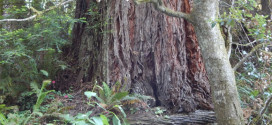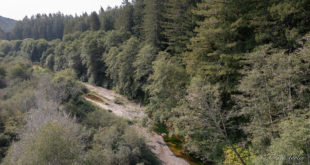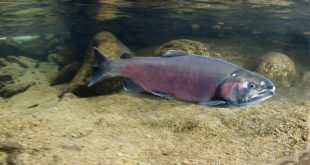by Tempra Board
The Sea Ranch Soundings • Summer 2021
© copyright 2021, The Sea Ranch Association
reprinted with permission
Friends of Gualala River (FoGR), our area’s grassroots watershed protection non-profit, continues its hard work defending the Gualala River from the threat of floodplain logging. On May 20, FoGR filed a motion for a preliminary injunction to halt logging of Gualala Redwood Timber (GRT) Company’s Dogwood timber harvest plan (THP), which had been stayed while FoGR’s state lawsuit went through the appeal process. Now that the state suit has ended, FoGR’s current federal lawsuit (filed in September 2020 in partnership with the national Center for Biological Diversity) can continue.
The federal suit alleges the Dogwood THP will violate the Endangered Species Act because it will result in the taking of four listed species found in the watershed: Central California Coast coho salmon, Northern California steelhead, California red-legged frogs, and Northern spotted owls. According to FoGR, the Dogwood THP will harm these and a host of other species and their habitat through not only the removal of large redwoods, but through the associated process of logging, including log hauling, roadbuilding, and road maintenance in the Gualala River floodplain. As this article was going to press, FoGR released new data showing that eDNA (Environmental DNA) of coho, steelhead, and the red-legged frog were present in the Gualala River in December 2020. This is important because it proves that three of the four species listed in the lawsuit are present.
The Dogwood area begins near the Gualala Point Regional Park Campground, adjacent to the Gualala River, in an area known by locals as the “Magical Forest” because of its beautiful stands of healthy 100+ year-old redwoods, ferns, sorrel, and a host of rare plants. It then stretches up river to Switchville, and extends for miles down the south fork, which flows parallel to The Sea Ranch and the Hot Spot. Since the Dogwood THP was originally approved by California Forestry and Fire Protection (CAL FIRE) (over the objections of hundreds of Mendonoma residents, scientists, and other agencies such as the California Department of Fish & Wildlife and the National Oceanic & Atmospheric Administration (NOAA) Fisheries) in 2015, FoGR has successfully blocked its implementation. The federal lawsuit is in the discovery phase now and is expected to go to trial by the end of this year.
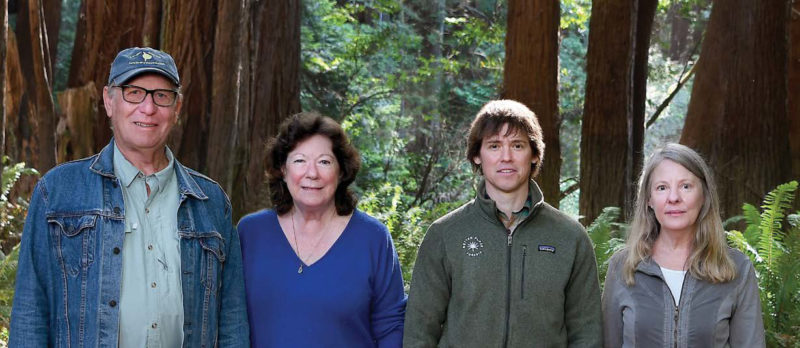
FoGR has stated that GRT’s lawyers have been aggressive, attempting to intimidate FoGR by threatening to sue individual members of its Board of Directors, if FoGR doesn’t agree to dismiss the suit. However, volunteer boards of non-profit organizations have statutory liability protections under sections 5047.5 and 5239 of California’s Corporation Code.
Of the hundreds of THPs filed by Gualala Redwood Timber and others in the last few decades, FoGR has only opposed a handful of them, specifically those that most directly stand to irreparably harm the Gualala River and its floodplain. The Dogwood fits this category, and “would remove many of the last, largest remaining trees in the watershed—and those monumental 100-year-old trees are located in the floodplain,” says Lynn Walton, FoGR’s Vice President.
GRT owns 29,000 acres of the 191,000-acre Gualala River watershed, though they aren’t the only entity that logs in it. FoGR has been able to work cooperatively with other landowners, such as The Conservation Fund, which practice sustainable forest management. “One of our major focuses is on protecting the floodplains,” Lynn adds. “FoGR is not against all logging but we want it to be done in a way that does not harm the endangered and threatened species that live in and around the floodplain and river, which we believe the Dogwood THP would do if we sat back and let it happen.”
“FoGR is not against all logging but we want it to be done in a way that does not harm the endangered and threatened species that live in and around the floodplain and river . . .” – Lynn Walton
Litigation is not the only tool in FoGR’s toolbox. Its volunteers regularly engage in education, outreach, and advocacy about the Gualala River floodplain and its inhabitants. Among its current efforts is to build a 3D topographic model of the river’s 300 square-mile watershed. Chris Poehlmann, former President of FoGR and Annapolis resident, builds interactive exhibits for museums, zoos, and aquariums, and has designed a model to be housed at the Gualala Point Regional Park visitor’s center and used to teach schoolchildren and visitors about the watershed. The Sonoma County Regional Parks Department has agreed to support this project with a $10,000 grant, but FoGR needs an additional $10,000 to complete it.
In addition, FoGR hosts expert-led educational events and workshops, which recently included a free Earth Day virtual workshop on salmonids with a senior scientist from California Trout. Local Mendonoma Sightings author Jeanne Jackson, FoGR’s Treasurer, conducts in-school educational workshops, sharing with students the various “creatures that live in and alongside the river.” Her mission is to help our community’s young people understand why and how to be good stewards of the floodplain. Jeanne says that when she shows them a picture of a steelhead fry or newborn western toad, the size of a tiny pebble, and explains that the floodplain is their home, they start to understand the harm done by driving over the gravel bar.
On the advocacy front, FoGR is working to convince the State Water Quality Control Board to follow its mandate to protect water quality in the Gualala River. In 2001, the EPA listed the Gualala River as “impaired” under the Clean Water Act due to extensive sediment and high temperatures—death sentences for spawning salmon. The EPA also set limits to the amount of pollution (in this case, sediment), called Total Maximum Daily Load (TMDL), that could enter the river and its tributaries without exceeding water quality standards.
However, the River remains listed as impaired and according to FoGR, the State and Regional Water Boards have not helped to address or control sources of sediment. FoGR hired a professional hydrologist to conduct a sediment analysis and has petitioned the State Water Board to, among other actions, “1) adopt the Gualala River’s TMDL into the North Coast Basin Plan; and, 2) develop and adopt an Action Plan to achieve the TMDL and improve water quality as required by the EPA Clean Water Act.”
FoGR continues to raise funds from the community to support the current lawsuit, as well as its advocacy and educational efforts. For the federal suit, it has raised $152,000 of its $175,000 goal as of May 19.
For more information or to make a contribution to ensure the health of our watershed, visit FoGR’s website at https://gualalariver.org.
Gualala Redwood Timber did not respond to requests to comment on the Dogwood THP or lawsuit. –Editor
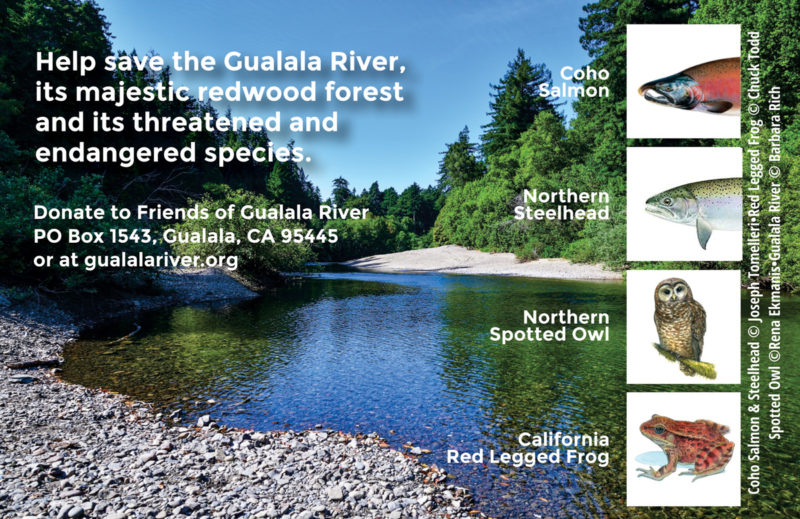
See also: Video: The Gualala River watershed is in danger from proposed logging
 Friends of Gualala River Protecting the Gualala River watershed and the species living within it
Friends of Gualala River Protecting the Gualala River watershed and the species living within it
